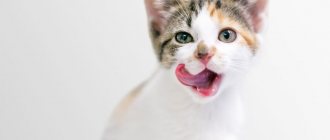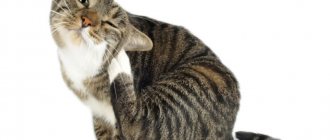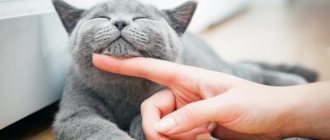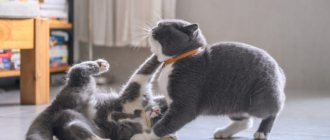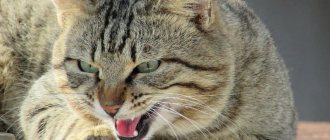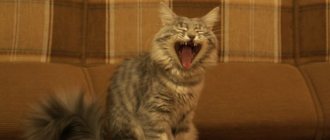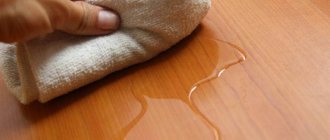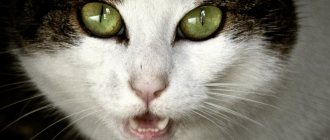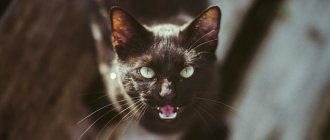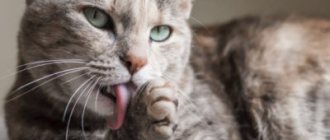Should I be concerned if my cat is constantly licking itself? In some cases, the owners' fears are indeed justified, but more often than not, the pet's behavior can be explained after a short observation. Your job is to cover as many suspicious signs and possibly symptoms as possible.
Many owners find it funny if a cat licks itself frequently. However, there is nothing funny about the intense production of saliva, because that is why the cat licks itself. Your pet is not necessarily sick; they may be experiencing discomfort or stress. When it comes to the disease, in addition to frequent licking, the clinical picture also contains more striking symptoms. In any case, if your ward licks himself too often and intensely, his behavior needs to be observed.
Natural causes
Natural causes include everything that happens on an instinctive level. Reflex licking is harmless and does not require outside intervention.
Hunger or thirst
Intense production of saliva is caused by a delicious smell, as well as the sight of the food itself, if the cat has not eaten for a long time. This reflex facilitates subsequent chewing and swallowing of food.
Don't forget about thirst. The desire to drink increases in hot weather and when eating dry kibble. If there is no constant access to water, then due to thirst the pet will often swallow and lick itself.
Washing after eating or drinking
A cat licking its lips should not surprise its owner immediately after eating or drinking. In this way, it removes food debris and its smell, and also licks off excess water.
Maintaining normal spout moisture
In the absence of pathologies, the nose of mustachioed pets is wet and cold. The appearance of dryness and warmth, eliminating illness, is acceptable during sleep and in hot weather. In both situations, cats lick vigorously, trying to regain lost phlegm.
Fur stuck on tongue
After washing, rare fragments of fur get stuck on the rough tongue. They cause discomfort to the animal, so to remove them the body stimulates the production of saliva. Because of this, the cat has to lick itself more often than usual.
The cat swallows often
Good afternoon Cat (Turkish Van) 1.3 years old, neutered at 7 months, completely domestic, no contact with the street over the last year, very hyperactive, living in Rostov-on-Don, food - Proplan with salmon for neutered dry, plus 3 times soft a week, raw chicken breast once a week, raw fish several times a month (he hasn’t eaten it for the last 3 months), constantly carries “non-cat” food from the refrigerator. A few days ago his voice changed, it became not so hoarse, but more Hoarse or something, the timbre has changed. two days ago there was an accidental contact on the staircase with a yard cat (she was sneezing, had green snot), he sniffed her and rubbed her (before that he had not seen other cats at all). And now two days later (and since yesterday he has not meows in general) as if he is trying to burp something, tilts his head low to the floor. But not intensely, silently, without drooling or wheezing, gently and once, at intervals of about once every 1-2 hours. It has been noticed that when scratching under the neck, the throat area, this spasm occurs, although not reliably, it practically leads to this. I haven’t pooped for more than a day. When you pick it up under the armpits, it makes a barely audible sound of “discontent,” as if grumbling and slightly extending its claws, i.e. makes it clear that there is discomfort; a wheezing sound is heard when breathing somewhere inside or something. He splashes and licks his lips all the time. And when swallowing, you can hear that it is difficult; a sound is made in the deep throat, as if a person is swallowing with his head thrown back. Prefers to lie near the battery. When palpating the abdomen, there were no pain reactions. I haven’t eaten anything that could get stuck in my throat this week. I had very little appetite yesterday. Today he doesn’t eat at all, sniffs, spits and turns away, doesn’t drink. He sleeps all the time, or sits with his paws tucked towards himself
The eyes are half-closed with the inner eyelid, sleepy. With sudden movements of the hand, he immediately pays attention, the eyes widen, he is interested, ready for a playful “attack,” but that’s where the matter ends
WHEN STROKING AND CAREFULLY IT DOESN'T PURL AT ALL, YET ONE TOUCH WAS ENOUGH!
There is no snot, eye or other discharge, the temperature in the evening of the 28th was 39.4, in the evening of the 29th - 38.7, on the 30th - at 1 am - 39.1. An injection of 0.5 cubes of Gamavit under the skin was given for prevention on the evening of the 29th.
I understand that there can be a huge number of reasons, I am a doctor myself, but at the moment we are in a place where there is no veterinary center, and we will be here for another week. Could he have contracted some kind of nasty disease from a barn cat? Although the timbre of the voice changed the day before contact with her... Is it appropriate to continue Gamavit? (once a day 0.5-0.7) Or is it a respirator? Then tell me some medications or antibiotics? (I tolerated amoxilav normally, I was injected once six months ago, my foot rotted) Then why are there problems with stool, before - every day.
Why a cat constantly licks itself: pathological reasons
Dangerous causes are accompanied by accompanying symptoms and an increase in the number of daily washings. Hygiene procedures occupy most of the waking hours, and the general condition of the mustachioed pet gradually worsens.
Nausea and conditions preceding vomiting
If your cat frequently licks and swallows, the reason for her strange behavior is most likely due to impending vomiting. Before an attack, animals wash only their faces, ignoring other parts of the body.
Nausea itself is not an independent disease. It accompanies gastrointestinal diseases, helminthiasis, poisoning and other dangerous pathologies that require the intervention of a veterinarian.
Nervous disorders
Mental problems should not be ruled out. These include stress and phobias. The former are associated with increased nervous tension, and the latter with severe fear that defies logical explanation.
Washing removes unpleasant odors, so whiskered pets feel calmer after washing. Rubbing against surrounding objects also helps them. In this way they distribute their pheromones secreted by their facial glands.
Diseases of various body systems
Another possible diagnosis option is systemic diseases. These include:
- Diseases of the urinary system (renal failure, ICD). The cat urinates frequently and drinks a lot. Severe nausea due to intoxication and weight loss are noted.
- Gastrointestinal pathologies (gastritis, pancreatitis, dysbacteriosis). Accompanied by stool disturbances, vomiting and loss of appetite.
- Diabetes. Lack of glucose leads to excessive and frequent urination, increased thirst and appetite, as well as rapid weight loss.
- Tumors in the oral cavity. Causes intense salivation and pain. Due to unpleasant sensations, the pet refuses food, but constantly approaches the feeder, feeling very hungry.
At the initial stage, most of these diseases are asymptomatic. A clear clinical picture appears only after complications, so until this point only a veterinarian can make a diagnosis.
Foreign body entry
Another reason why a cat constantly licks and swallows is the entry of a foreign body into the oral cavity or its ingestion. In the first case, the body tries to remove the foreign object on its own - through excessive salivation and vomiting. In the second case, these methods do not work, so the swallowed object is removed surgically.
Poisoning or infection
An attack of vomiting, accompanied by frequent licking, diarrhea and high fever are characteristic of intoxication of the body. It is caused by poisons, chemicals, spoiled foods and infections.
Problems with teeth or gums
Problems with the oral cavity should not be ruled out. Constant licking due to excess saliva occurs with caries, pulpitis and periodontitis. All these diseases can be accompanied by a putrid odor from the mouth, increased swallowing and loss of appetite.
Helminth infection
The risk group includes cats that walk outside and eat raw meat or fish. Parasites can be recognized by severe itching, weight loss, diarrhea, deterioration in coat quality and bloating.
With helminthiasis, a cat licks wounds on the body that form due to scratching. Because of this, they can easily get a secondary infection, so at the first signs of infection, you need to make an appointment at the veterinary clinic.
Skin problems causing itching
Scabies appears not only due to worms, but also due to other skin problems. These include:
- Allergy. The symptoms of the disease depend on its cause. The cat may experience skin rashes, diarrhea, vomiting, runny nose and local baldness.
- Dermatitis. The main symptom of dermatitis is the presence of inflammation on the skin. It peels and turns red, or becomes wet and ulcerated.
- Flea infestation. Flea bites are not only painful, but also dangerous. These parasites carry deadly infections, and their saliva often causes allergies.
Please note that cat fleas do not disdain human blood at all. Unlike their brothers, they easily adapt to new owners. Thanks to this, flea infestation is very easy to distinguish from other diseases that cause itching.
Common diseases
The most common diseases in porridge are parasitic. Timely prevention is the best treatment for these diseases. You can find many different anthelmintic drugs in any pet store or veterinary pharmacy. In the end, you should always remember about skin parasites: fleas, ticks, lice eaters. It is enough to simply treat the cat with insecticidal shampoo, as written in the instructions. Another option is to rub an antiparasitic agent into the skin, in the area of the withers, of which there are many in veterinary pharmacies.
Another disease that a cat can get is otitis media (inflammation of the middle ear). This disease brings unbearable pain to your pet. The main cause of this disease is drafts, plus microorganisms such as streptococcus and staphylococcus.
For treatment, it is necessary to take a course of antibiotics. And, also, it is necessary to regularly wash the cat’s ears with hydrogen peroxide (3% solution), then you need to drip 2 drops of iodoform ether inside. And of course, be sure to take painkillers.
Cats are very susceptible to a disease such as purulent conjunctivitis; it is most often caused by pyogenic microorganisms. The main symptom of the disease is the appearance of a characteristic purulent sac on the animal’s eye. When treating this disease, it is imperative to use intramuscular antibiotics. Also, you need to regularly and methodically wash your cat’s eyes with a weak solution of furatsilin, and be sure to apply ointments such as tetracycline, oletethrin, erythromycin to the conjunctival sac every day. If necessary, give sulfonamide drugs orally.
Helping your pet at home
Before contacting the veterinarian, be sure to note the accompanying symptoms and remember all recent events. You can solve the problem by eliminating the root cause:
- Nervous disorders. Attention (affection, playing with a rope) and sedatives with pheromones will help cope with stress. If it's all about fear, change the conditions of detention. Most often, mustachioed pets suffer from claustrophobia, so they need more personal space.
- Entry of a foreign body into the oral cavity. If the object is not deep, remove it with tweezers.
- Poisoning. At home, it is permissible to provide first aid aimed at slowing down the intoxication process. This includes gastric lavage, taking sorbents, giving an enema and rinsing the skin from toxic drugs.
- Flea infestations and helminthiases. Most antiparasitic drugs can be taken without prescription. Exceptions include young age, pregnancy and severe disease.
- Allergy. If you know the allergen, then try to get rid of it: change food, shampoo and other possible irritants. If there are no changes, use antihistamines.
In all other cases, treatment is selected by the veterinarian. Depending on the condition, the pet may require not only conservative, but also surgical therapy.
What symptoms require an urgent trip to the vet?
If you feel stable, you can wait a little longer with the diagnosis. Urgent veterinary care is only necessary when the following symptoms appear:
- loss of motor activity and response to external stimuli;
- increase or decrease in body temperature;
- partial or complete loss of appetite, as well as sudden weight loss;
- deterioration in coat quality (dullness, thinning, baldness);
- the formation of ulcers, rashes, papules and blisters with liquid on the skin;
- severe itching accompanied by active scratching;
- increased thirst or refusal of water;
- frequent vomiting and diarrhea.
With such symptoms, self-help will not only not bring results, but will also cause harm. Instead, the sick pet should be taken to the veterinarian. The reason explaining why the cat often licks itself will be determined after passing all the necessary tests. Based on this, treatment will be selected for the patient.
Symptomatic treatment
The symptom does not require treatment, you need to find out and eliminate the cause. If possible, it is better to take the animal to the veterinarian. Because serious infectious diseases, for example, diabetes or kidney pathology, cannot be independently identified or cured. You can independently examine the animal’s oral cavity, and, if the cat is allowed to remove the fishing line or remove the rain, another foreign object. You can feel the abdomen (hard/soft, painful/painless). And monitor the symptoms associated with frequent swallowing.
In addition to swallowing, the following symptoms should alert you:
- the cat may hiss and meow;
- breathing becomes irregular or heavy;
- the animal is lethargic and refuses to eat;
- saliva continuously flows from the mouth;
- bleeding gums appear;
- the cat has abdominal pain, diarrhea, fever and belching;
- the cat loses consciousness (in this case, you need to run to the vet very urgently, as the minutes are counting).
At the clinic, a specialist will examine the animal, conduct an examination and give recommendations for treatment.
If there are no serious problems, the pet and the owner will be sent home.
A serious condition is a reason to leave the cat under the supervision of specialists. In some cases, the veterinarian will prescribe IVs and injections, then the cat will also have to be left in the hospital.
When the underlying disease is eliminated, excessive swallowing, excessive viscosity of saliva and other unpleasant symptoms will go away. To prevent the situation from recurring, you need to follow the care recommendations and bring your cat for a consultation with a veterinarian once a year (for the first time after a serious illness, it is recommended to do this once every 2-3 months).
